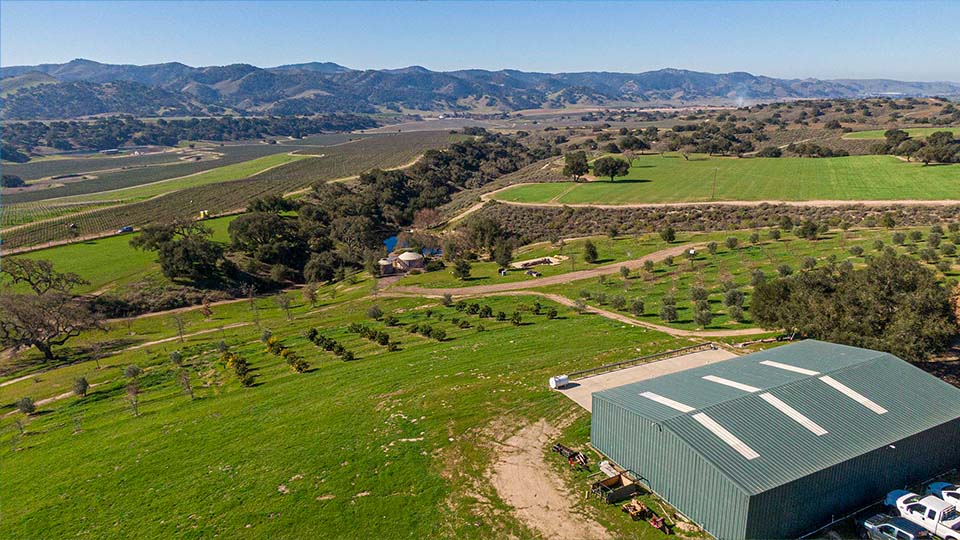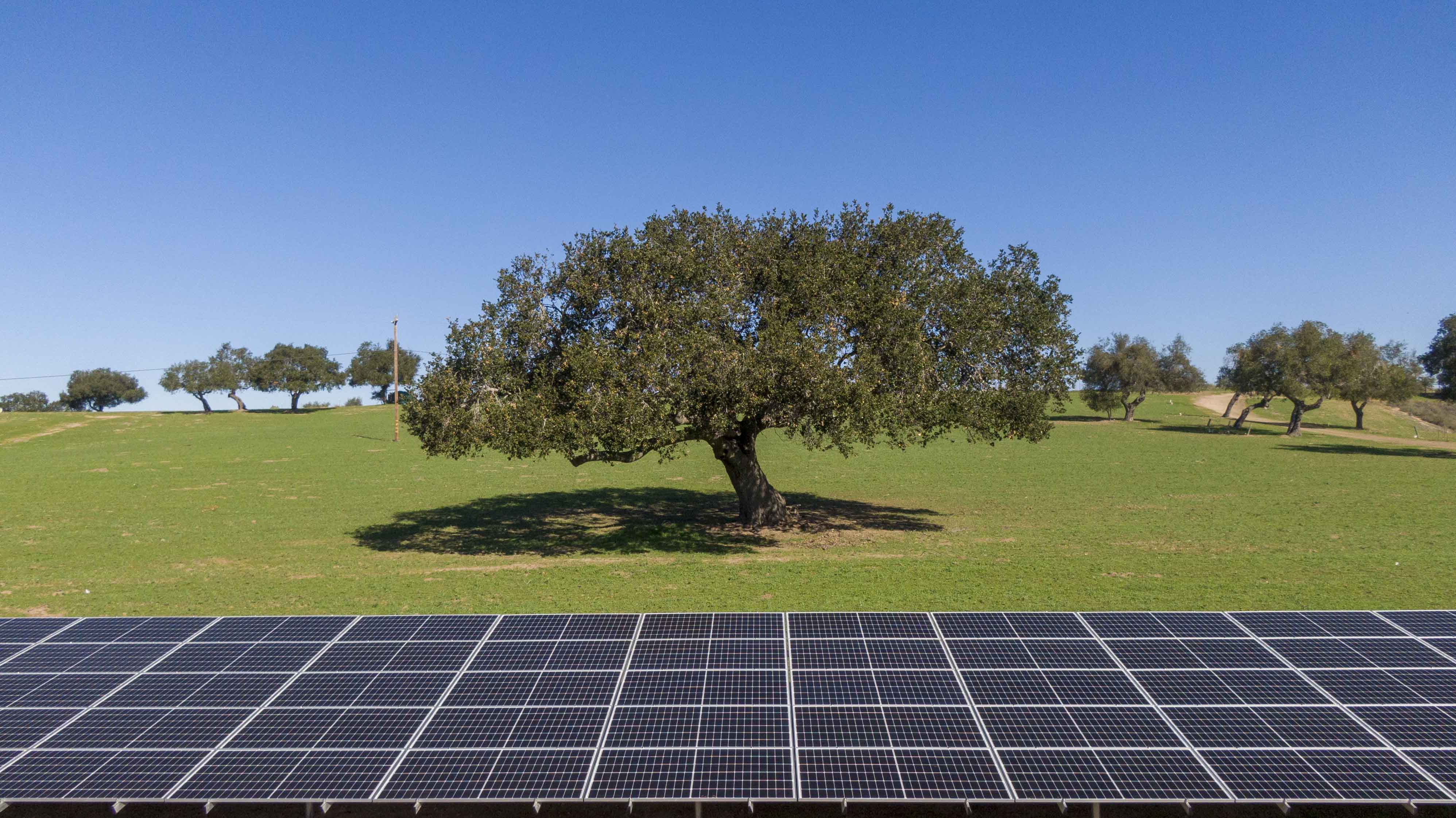Here’s the thing: organic farming is so much more than the pesticide-free produce you pick up at the farmer’s market. It’s an integrated way of managing our relationship to the land and the life it supports that prioritizes ecological balance and resilience. When our founder Jessica set out to convert a vineyard into an organic farm to grow her own calendula, she knew it wouldn’t be easy. She also knew that in the long run it would pay off. Our commitment to organic farming produces a calendula flower extract second to none while protecting the wellbeing of our farm’s ecosystem for generations to come.

A view from above–our certified organic farm in Santa Barbara, California
What is organic farming?
Organic agriculture is not simply the substitution of chemicals for natural substances. It emphasizes the ecological health of the whole system — from soil and crops to wildlife and energy. The primary difference between organic and conventional agriculture is the way each approaches damage control. While organic agriculture aims to create an ecosystem with a strong foundation of healthy, pesticide-free soil, plants and irrigation systems to avoid the need for intrusive damage control, conventional agriculture relies on pesticides and chemical fertilizers for fast turnarounds on crop yield and to quickly wipe out plants that are sick from poor conditions.
How does organic farming support the whole ecosystem?
Plants and animals have evolved to depend on one another for survival. When humans isolate a specific plant in a sterile environment for agricultural reasons, it disrupts the interdependent relationships that keep nature in balance, often at the detriment of the surrounding habitat. Organic practices aim to use natural methods that welcome and work with biodiversity to encourage that collaboration. Below are some of the benefits of organic farming.
Pesticide-free products
Organic practices from crop rotation (different plants attract different bugs and birds, so rotating crops helps maintain a natural check on infestations) to composting (rich, nutrient-dense soil equals healthy plants and less waste!) don’t rely on pesticides or chemical fertilizers. Needless to say, the fewer pesticides used in growing calendula for skin products, the fewer pesticides end up on sensitive skin. That’s why our Calendula Cream is a fan-favorite for those with dry, irritated or sensitive skin — we don’t use any pesticides on our calendula or entire organic farm.

Our founder Jessica in the organic calendula fields
Smaller carbon footprint
It takes time and energy (and the burning of lots of fossil fuels) to make and disperse pesticides and excessively till the ground. On the other hand, healthy soil created by organic farming practices actually increases the amount of carbon that gets trapped in the soil, so less goes into our atmosphere (take that global warming!). At California Baby, our calendula is not the only thing powered by the sun – we make our carbon footprint even smaller by running our farm primarily on solar power.

These solar panels power our farm!
Soil health, stability and regeneration
Soil is a micro-ecosystem in and of itself and can easily be depleted from over-tilling, infestations of pests, synthetic fertilizers, pesticide use, and mono-cropping. The world grows 95% of its food in the uppermost layer of soil, making topsoil one of the most important components of our food system. But thanks to conventional farming practices, nearly half of the world’s most productive soil has disappeared in the last 150 years, threatening crop yields and contributing to nutrient pollution, dead zones and erosion. In the US alone, soil on cropland is eroding 10 times faster than it can be replenished.
Organic agriculture allows the natural cycling of energy and nutrients throughout the soil so it can constantly regenerate itself. Rotating crops, inter-cropping and cover cropping all contribute to soil that is alive and well.
Cleaner air and water
No pesticides mean no burning of fossil fuels to make and spread them. On the topic of spreading them: Once they are disseminated into the soil, pesticides and other agrochemicals remain in the soil, seep into groundwater and runoff into downstream waterways. Weather, animals and erosion can also disperse pesticides from conventional farms to other landscapes and waterways (including reservoirs for drinking water). Farming without pesticides or chemical fertilizers avoids these downstream health hazards, resulting in cleaner air and water for everyone.
Preserves biological diversity
California Baby’s farm is home to more than our calendula flowers. Wildlife like wild pigs, snakes and coyotes make their homes alongside French lavender, heritage roses and wine grapes that blanket our sunny hillsides. Our orchard is brimming with olives, stone fruit, citrus and songbirds. And we’ve recently introduced ten beehives abuzz with the vital work of pollination on Bee Lane. Biological diversity provides a constant flow of energy and ecological balance. Organic agriculture maintains the diversity of soil biota, too, leading to a more nutrient-rich environment to support our crops and all of our plant and animal friends.

One of the honey bee hives at our farm
Why honeybees are so important
While bees play a critical role in the health of our crops, their presence on our farm is so much bigger than California Baby. Honeybees are essential to the entire planet’s food supply because of their irreplaceable role in pollination and plant reproduction. Industrial agriculture practices are threatening the health, diversity and very existence of honeybees.
So when we added ten (and counting!) beehives to our calendula farm it wasn’t just for our calendula. We’re creating a haven where bees can thrive in a supportive environment with multiple food sources. With time and expert caretaking, this can help diversify the bee’s gene pool, strengthening the species overall.
What are the impacts of industrial monocropping?
Monocropping, or the planting of a single crop on the same farmland year after year, using conventional agricultural methods like pesticides and chemical fertilizers exposes downstream communities to health hazards and degrades the overall wellbeing of the environment. Plus, it doesn’t necessarily yield more or better. Disrupting the ecosystem’s natural checks and balances can lead to crop collapse, a threat more and more farmers are faced with in today’s agrochemical culture.
Pesticide poisoning
Pests aren’t the only ones harmed by pesticides. Conventionally farmed produce and pesticide-laden water run-off are contributors to cumulative pesticide poisoning in humans. Independent testing even found residue levels of Roundup, a commonly used pesticide, in popular kids’ cereals. The health consequences can be dermatological, gastrointestinal, neurological, carcinogenic, respiratory or reproductive. Organic ingredients are one way we can avoid exposure to pesticides and their toxicity.
Increased greenhouse gas emissions
Industrial monocropping relies heavily on fossil fuel-intensive chemical fertilizers and pesticides as well as fuel-burning equipment. Additionally, monocropping depletes soil of organic matter, causing an excess release of carbon into the air.
Soil erosion and infertility
Soil is a tiny world in itself. In a single teaspoon of fertile soil there can be 10,000 to 50,000 species of microorganisms. When farmers spray pesticides or over-till, they are destroying the habitat of organisms that hugely contribute to the well-being of the plants that grow out of it. We’ve witnessed the benefits of healthy, regenerative soil ourselves in our big, vibrant orange calendula flowers that give us our pure and potent Calendula Extract.
Water pollution
Agrochemical runoff into waterways has led to marine dead zones and contaminated river systems. Even rainfall can be polluted with pesticides from evaporated groundwater.
Reduced biodiversity
Because monoculture farming focuses on a single crop on the same land, it reduces biodiversity. Healthy environments host a variety of species from animals and plants to insects and fungi that all play a role in keeping populations in check and the soil healthy. When biodiversity and its self-balancing mechanisms are removed, crops are more, not less, vulnerable to collapse. New pests and diseases routinely outsmart the latest pesticide and no longer have natural predators, leading to population booms that require even more pesticides to control.
The takeaway
As an active member of our collective ecosystem, the products we choose to use have a much bigger impact beyond ourselves and our families. Choosing responsible, organic and plant-based skincare may seem like a small step in reducing our carbon footprint, but many small steps add up to big changes. We aim for transparency from seed to shelf with all our calendula skincare so you can feel good about supporting the health of your little one and the planet.
 Jessica meditating at the pond
Jessica meditating at the pond














